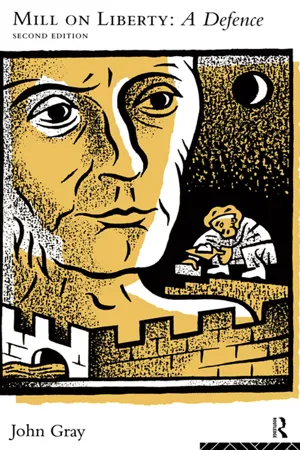
- 192 pages
- English
- ePUB (mobile friendly)
- Available on iOS & Android
Mill on Liberty: A Defence
About this book
Mill on Liberty was first published in 1983 and has become a classic of Mill commentary. The second edition reproduces the text of the first in full, and in paperback for the first time. To this, John Gray adds an extensive postscript which defends the interpretation of Mill set out in the first edition, but develops radical criticisms of the substance of Millian and other liberalism.
The new edition is intended as a contribution to the current debate about the foundations of liberalism, and it looks closely at the recent seminal contributions to liberal thought by Raz, Feinberg, Rawls and Berlin. Central to its argument is Gray's contention that, like other liberalisms that ground themselves on an ideal of autonomy or individuality, Millian liberalism has a Eurocentric bias that cannot be given rational justification. Gray addresses the question of whether any form of liberal theory, can, in fact, avoid the bias, and concludes that it cannot.
This book will be indispensable both to those familiar with On Liberty and to those coming to it for the first time. In addition, the book will also be of great interest to moral and political theorists, to students of law and jurisprudence and to intellectual historians.
Tools to learn more effectively

Saving Books

Keyword Search

Annotating Text

Listen to it instead
Information
1 | J.S.Mill, Utilitarianism, On Liberty and Considerations on Representative Government, London, Dent, 1972, p. 72. |
2 | Ibid., p. 73. |
3 | Ibid., p. 74. |
4 | Ibid., p. 6. |
5 | Ibid., pp. 72–73. |
6 | Ibid., p. 73. |
7 | Ibid., p. 74. |
8 | Barry’s arguments about the self-defeating effect of liberal principles, which draw on the distinction between want-regarding and ideal-regarding considerations which he made in Political Argument, London, Routledge & Kegan Paul, 1965, pp. 41–42, may be found summarised on pp. 126–7 of his The Liberal Theory of Justice, Oxford, Clarendon Press, 1973. |
9 | That liberalism is neutral with respect to competing views of the good life is claimed by Dworkin, most explicitly in his paper ‘Liberalism’, in Public and Private Morality, ed. S.Hampshire, Cambridge University Press, 1978. |
10 | The view of Mill as a moral totalitarian is developed in Maurice Cowling’s Mill and Liberalism, Cambridge University Press, 1963, and in S.R.Letwin’s The Pursuit of Certainty, Cambridge University Press, 1965. The view that, if Mill endorses a specific ideal of human excellence, then he is necessarily implicated in a kind of moral totalitarianism, is very ably criticised by C.L.Ten in his Mill on Liberty, Oxford, Clarendon Press, 1980, pp. 146–151. |
11 | Ethics, Oxford University Press, 1966, p. 121. |
12 | See Ronald Dworkin, Taking Rights Seriously, London, Duckworth, 1977, pp. 90–94, 188–192. In the revised edition of his book (1978), Dworkin allows (pp. 294–301, 313–15) that there may be a consequentialist theory of rights. |
13 | See Robert Nozick, Anarchy, State and Utopia, Oxford, Basil Blackwell, 1974, pp. 28–33. |
14 | See John Lucas, On Justice, Oxford University Press, 1980, ch. 2. |
15 | See Mill, op. cit., p. 58, footnote. |
16 | See Fitzjames Stephen, Liberty, Equality, Fraternity, Cambridge University Press, 1967. |
17 | By ‘traditional’ and ‘revisionary’ interpretations, I do not intend to refer to two groups of writers, each of which shares a common view on all important points in the interpretation and criticism of Mill on liberty. But important recent statements of a traditional view of Mill on liberty may be found in H.J.McCloskey, John Stuart Mill: a Critical Study, London, Macmillan, 1971; and in the writings of Ted Honderich, especially his Punishment: the Supposed Justifications, London, Hutchinson, 1969, p. 175 et seq., and his The Worth of J.S.Mill on Liberty’, Political Studies, December 1974, vol. XXII, no. 4, pp. 463–470; and in Isaiah Berlin’s ‘John Stuart Mill and the Ends of Life’, in Four Essays on Liberty, Oxford University Press, 1969, p. 173 et seq. The revisionary view designates that wave of reinterpretation of Mill begun by Alan Ryan and J.C.Rees in the 1960s. Alan Ryan’s main contributions are to be found in ‘Mr. McCloskey on Mill’s Liberalism’, Philosophical Quarterly, 1964, vol. 14, pp. 253–260; ‘John Stuart Mill’s Art of Living’, The Listener, 22 October 1965, vol. 74, pp. 620–2; The Philosophy of John Stuart Mill, London, Macmillan, 1970; John Stuart Mill, London, Routledge & Kegan Paul, 1974; ‘John Stuart Mill and the Open Society’, The Listener, 17 May 1973, pp. 633–5. For Rees’s contributions, see ‘A Re-reading of Mil... |
Table of contents
- Cover
- Half Title
- Title Page
- Copyright
- Contents
- Acknowledgements and Bibliographical Note
- Preface
- Preface to the second edition
- I: Mill’s Problem in On Liberty
- II: Mill’s Utilitarianism
- III: The Principle of Liberty
- IV: Mill’s Conception of Happiness and the Theory of Individuality
- V: Applications
- VI: Mill’s Doctrine of Liberty: A Reappraisal
- Postscript
- Notes
- Index
Frequently asked questions
- Essential is ideal for learners and professionals who enjoy exploring a wide range of subjects. Access the Essential Library with 800,000+ trusted titles and best-sellers across business, personal growth, and the humanities. Includes unlimited reading time and Standard Read Aloud voice.
- Complete: Perfect for advanced learners and researchers needing full, unrestricted access. Unlock 1.4M+ books across hundreds of subjects, including academic and specialized titles. The Complete Plan also includes advanced features like Premium Read Aloud and Research Assistant.
Please note we cannot support devices running on iOS 13 and Android 7 or earlier. Learn more about using the app